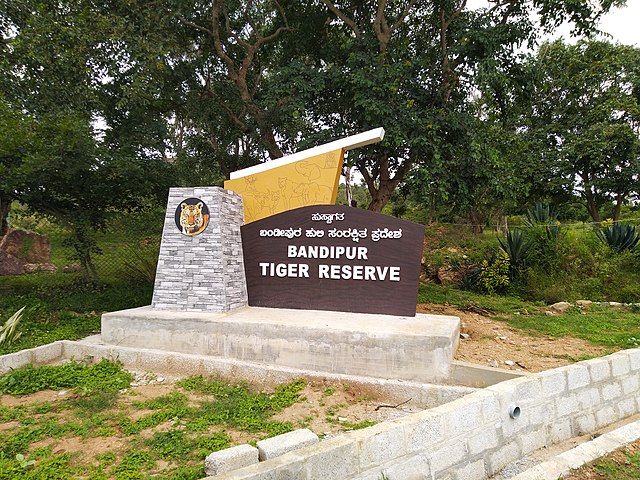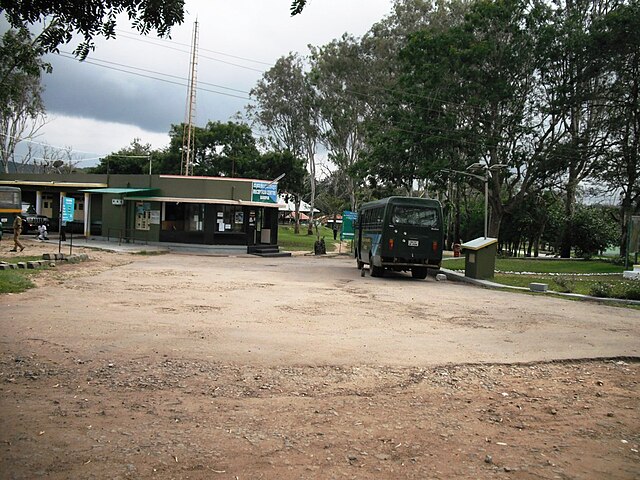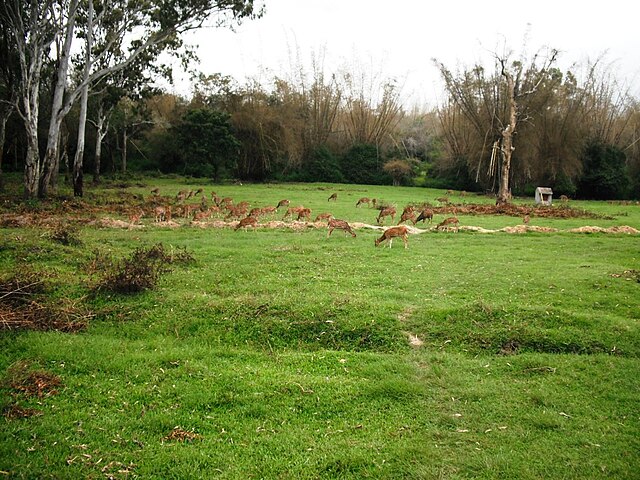Bandipur Tiger Reserve is one of the most popular and well-known wildlife destinations in India. Located in the southern state of Karnataka, Bandipur is home to a rich variety of flora and fauna, including the majestic Bengal tiger, the endangered Asiatic elephant, and many other rare and endemic species.
Bandipur is also part of the Nilgiri Biosphere Reserve, which is a UNESCO World Heritage Site and one of the largest conservation areas in the country. In this article, we will give you an overview of Bandipur Tiger Reserve, its location, timing, entry fees, how to reach, and the best time to visit. Famous Tourist Places In Kerala
Overview of Bandipur Tiger Reserve

Bandipur Tiger Reserve was established in 1973 under the Project Tiger initiative, which aimed to protect and conserve the dwindling population of tigers in India. Bandipur was originally a hunting ground for the Maharajas of Mysore, who later converted it into a wildlife sanctuary in 1931. The sanctuary was then expanded and renamed as Bandipur National Park in 1974, and later became a tiger reserve in 1985. Bandipur covers an area of 912.04 sq km, and is divided into four ranges: Bandipur, Gopalaswamy Betta, Mangala, and Kundukere. Bandipur is also connected to three other wildlife sanctuaries: Nagarhole in Karnataka, Mudumalai in Tamil Nadu, and Wayanad in Kerala. Together, they form the Nilgiri Biosphere Reserve, which spans over 5,500 sq km and is the largest protected forest area in India.
Bandipur Tiger Reserve is known for its diverse and rich biodiversity, which includes over 100 species of mammals, 350 species of birds, 80 species of reptiles, and 2000 species of plants.
Some of the prominent wildlife attractions in Bandipur are:
- Bengal tiger: Bandipur has one of the highest densities of tigers in India, with an estimated population of 140 individuals as per the 2018 census. Tigers are the apex predators in Bandipur, and can be seen roaming in the forests, grasslands, and waterholes. Bandipur is also a part of the Mysore-Nilgiri landscape, which is one of the most important tiger habitats in the world.
- Asiatic elephant: Bandipur is a part of the largest elephant corridor in Asia, which connects the Western and Eastern Ghats. Bandipur has a population of over 1500 elephants, which migrate seasonally across the landscape. Elephants are the keystone species in Bandipur, and play a vital role in maintaining the ecosystem.
- Indian gaur: Bandipur is also home to the largest wild bovine in the world, the Indian gaur. Gaurs are massive and muscular animals, which can weigh up to 1000 kg and stand up to 2 meters tall. Gaurs are herbivorous and feed on grasses, leaves, and fruits.
- Dhole: Bandipur is one of the few places in India where the endangered dhole, or the Indian wild dog, can be seen. Dholes are highly intelligent and cooperative hunters, which hunt in packs of 10 to 20 individuals. Dholes feed on a variety of prey, such as deer, wild boar, hare, and even buffalo.
- Leopard: Bandipur is also a habitat for the elusive and graceful leopard, which is the most adaptable and widespread of the big cats. Leopards are solitary and nocturnal animals, which hunt mostly at night and rest during the day. Leopards are excellent climbers and can often be seen resting on tree branches. Leopards feed on a variety of prey, such as deer, monkeys, rodents, and birds.
Location of Bandipur Tiger Reserve

The Bandipur Tiger Reserve is located in the Chamarajanagar district of Karnataka, about 80 km from Mysore and 220 km from Bangalore. Bandipur lies in the foothills of the Nilgiri Hills, and is surrounding by the Western Ghats on the west and the Eastern Ghats on the east. Bandipur is situated at an altitude ranging from 680 m to 1454 m above sea level, and has a tropical climate with distinct wet and dry seasons. The average annual rainfall in Bandipur is about 1000 mm, and the average temperature ranges from 15°C to 35°C.
Timing and Entry Fees of Bandipur Tiger Reserve

Bandipur Tiger Reserve is open for visitors throughout the year, except on the day of Holi festival. The park timings are from 6:30 am to 9:00 am and from 3:30 pm to 6:00 pm. The entry fees for Bandipur are as follows:
- Indian nationals: Rs. 300 per person
- Foreign nationals: Rs. 1100 per person
- Children below 10 years: Rs. 150 per person
- Camera: Rs. 200 per camera
- Video camera: Rs. 1000 per camera
The entry fees are inclusive of the safari charges, which are conduct by the forest department in buses or jeeps. The Bandipur safari duration is about 45 minutes, and covers a distance of about 15 km. The safari vehicles are allott on a first-come-first-serve basis, and the seating capacity is limit. The safari timings are as follows:
- Morning safari: 6:30 am to 8:00 am and 8:30 am to 10:00 am
- Evening safari: 3:30 pm to 5:00 pm and 5:30 pm to 6:30 pm
The Bandipur safari routes are decide by the forest department, and vary depending on the season and the wildlife movement. The Bandipur safari guides are well-train and knowledgeable, and help the visitors spot and identify the wildlife. The safari vehicles are equip with binoculars and wildlife books for the convenience of the visitors.
How to Reach Bandipur Tiger Reserve

Bandipur Tiger Reserve is well-connect by road, rail, and air. The nearest airport is the Kempegowda International Airport in Bangalore, which is about 260 km from Bandipur. Nearest railway station is the Mysore Junction, which is about 80 km from Bandipur. The nearest bus station is the Gundlupet Bus Station, which is about 20 km from Bandipur. There are regular buses and taxis available from Bangalore, Mysore, and Gundlupet to Bandipur. The road to Bandipur is scenic and smooth, and passes through the Bandipur forest. The road is also a part of the NH 766, which connects Kerala and Karnataka. However, the road is close for traffic from 9:00 pm to 6:00 am, to avoid disturbance to the wildlife.
Best Time to Visit Bandipur Tiger Reserve
Bandipur Tiger Reserve can be visit throughout the year, as each season offers a different experience and opportunity to witness the wildlife. However, the best time to visit Bandipur is from October to March, when the weather is pleasant and dry, and the vegetation is green and lush. This is also the ideal time for birdwatching, as many migratory birds visit Bandipur during this period. The summer months from April to June are hot and dry, but offer a good chance to spot the animals near the water sources. The monsoon months from July to September are wet and humid, but bring a fresh and vibrant look to the forest. The monsoon is also the breeding season for many animals, and one can see the young ones of the wildlife.
The Bandipur Tiger Reserve is a must-visit destination for wildlife lovers, nature enthusiasts, and adventure seekers. Bandipur offers a unique and unforgettable experience of witnessing the wild and wonderful creatures of the forest, in their natural and pristine habitat. The Bandipur Tiger Reserve is also a place of learning and awareness, where one can appreciate the beauty and importance of nature, and the need to conserve and protect it. Bandipur is a place where one can reconnect with oneself, and with the earth.
Significance of Bandipur Tiger Reserve
The Bandipur Tiger Reserve is not only a wildlife destination, but also a significant ecological and cultural asset. Bandipur has several ecological and socio-economic benefits, such as:
- Bandipur is a part of the Nilgiri Biosphere Reserve, which is a hotspot of biodiversity and endemism. Bandipur conserves and protects many rare and threatened species of plants and animals, which are of global conservation value. Bandipur also contributes to the genetic diversity and evolutionary potential of the wildlife.
- Bandipur is a part of the largest elephant corridor in Asia, which facilitates the movement and migration of elephants across the landscape. Bandipur ensures the survival and well-being of the elephants, which are the flagship species of the forest. Bandipur also mitigates the human-elephant conflict, which is a major challenge in the region.
- Bandipur is a source of water and other ecosystem services for the surrounding areas. Bandipur regulates the hydrological cycle and maintains the water quality and quantity of the rivers and streams that originate from the forest. Bandipur also provides other services, such as carbon sequestration, soil conservation, nutrient cycling, and climate moderation.
- Bandipur is a hub of tourism and livelihood opportunities for the local communities. Bandipur attracts thousands of tourists every year, who come to enjoy the wildlife and nature. Bandipur generates revenue and employment for the forest department, the tourism industry, and the local people. Bandipur also supports the traditional and cultural practices of the indigenous tribes, such as the Soligas and the Jenu Kurubas, who live in and around the forest.
The Bandipur Tiger Reserve is a valuable and vital part of the natural and cultural heritage of India. Bandipur is a symbol of the coexistence and harmony between humans and nature, and a testament to the conservation efforts and achievements of the country.
FAQ’s
Here are some of the frequently ask questions and answers about Bandipur Tiger Reserve:
A: There are several options for accommodation near Bandipur Tiger Reserve, ranging from budget to luxury. Some of the popular places to stay are: Bandipur Safari Lodge, The Serai Bandipur, Dhole’s Den, MC Resort, and Nijaguna Resort.
A: Bandipur Tiger Reserve is surrounding by many other attractions, such as: Nagarhole National Park, Mudumalai National Park, Wayanad Wildlife Sanctuary, Ooty, Coonoor, Mysore, and BR Hills.
A: Bandipur Tiger Reserve is a protect area, and visitors are expect to follow some rules and regulations, such as:
Keep Clean, Do not litter or pollute the forest or the water sources.
Do not feed or disturb the wildlife or the birds.
Do not make loud noises or play music in the forest.
Don’t smoke or light fire in the forest.
Don’t carry any weapons or explosives in the forest.
Do not pluck or damage any plants or flowers in the forest.
Book advance Do not venture out of the safari vehicles or the designated trails in the forest.
Do not take any photographs or videos without permission from the forest department.
Do respect the rights and customs of the local people and the tribes.
Conclusion
The Bandipur Tiger Reserve is a wonderful and worthwhile destination for anyone who loves wildlife and nature. Bandipur offers a unique and unforgettable experience of witnessing the wild and wonderful creatures of the forest, in their natural and pristine habitat. The Tiger Reserve is also a place of learning and awareness, where one can appreciate the beauty and importance of nature, and the need to conserve and protect it. Bandipur is a place where one can reconnect with oneself, and with the earth. Bandipur is a place where one can find peace and joy.

